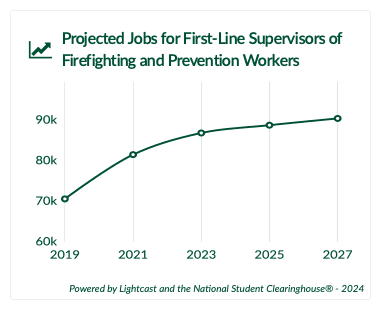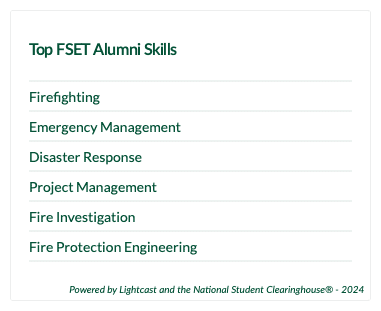Fire and Safety Engineering Technology, B.S.
Program Overview
The UNC Charlotte Bachelor of Science in Fire and Safety Engineering Technology (FSET) program stands out as a pioneer in fire safety education, designed by and for fire service professionals. If you are looking to advance in your current role in fire safety, this program offers the education and flexibility needed to succeed.
Flexible Learning for Working Professionals in the Fire Service
Understanding the demands of professional commitments, UNC Charlotte has tailored the Fire and Safety Engineering Technology program to be flexible with 100% asynchronous online instruction. This format ensures that students can balance their education with personal and professional responsibilities effectively.
Seamless Transfer Opportunities
UNC Charlotte’s Bachelor of Science in Fire and Safety Engineering Technology program offers a seamless transfer pathway for graduates from the 19 North Carolina community colleges with an Associate of Applied Science in Fire Protection, Fire Science, or similar degrees. This unique aspect ensures that you can transfer without losing credits, facilitating a smooth progression to completing your degree.
Program Contact

- Tyeisha Washington
- Enrollment Team
- online@charlotte.edu
- 704-687-5235
- Schedule appointment
Still trying to decide?
Ready to apply?
Apply NowCourses
The BSET in Fire and Safety Engineering Technology with a Concentration in Fire Safety program consists of 120 credit hours.
A.A.S. Degree (60 credit hours)
Students transferring from approved A.A.S. programs are eligible to receive up to 60 credit hours for their A.A.S. degree. As a result, these students only need to complete the upper-division courses listed below and address any entry-level deficiencies identified at the time of enrollment.
Major Courses (51 credit hours)
- ETFS 3123 Industrial Hazards and Electricity (3)
- ETFS 3124 Risk Management (3)
- ETFS 3144 Active Fire Protection (3)
- ETFS 4123 Community Threat Assessment and Mitigation (3)
- ETFS 4272 Fire and Safety Capstone (3)
- ETFS 4323 Advanced Fire Service Administration (3)
- ETGR 3222 Engineering Economics (3)
- PSYC 2171 Introduction to Industrial/Organizational Psychology (3)
- PSYC 3174 Organizational Psychology (3)
- ETFS 3103 Fire Behavior (3)
- ETFS 3103L Fire Behavior Lab (1)
- ETFS 3141 Fire Safety in Constructed Facilities (3)
- ETFS 3695 Fire Safety Prof. Development Seminar (2)
- POLS 3119 State and Local Government (3)
- POLS 3126 Introduction to Public Administration (3)
- ETFS 4901 Fire Safety Res. & Data Analysis (3)
- XXXX 1511 Local Theme (Social Science) (3)
- XXXX 1512 Global Theme (Arts / Humanities) (3)
Restricted Elective Courses (9 credit hours)
Select three 3000- or 4000-level courses within the Department of Engineering Technology and Construction Management with a minimum of 9 credit hours that are not already required for the major. Select from the following:
- CMET 3000 level or above
- ELET 3000 level or above
- ENER 3000 level or above
- ETCE 3000 level or above
- ETFS 3000 level or above
- ETGR 3000 level or above
- ETME 3000 level or above
Admissions
The UNC Charlotte Fire and Safety Engineering Technology with a concentration in Fire Safety is designed for transfer applicants who have an AAS in Fire Protection, Fire Science, or similar title with curriculum acceptable to the department. A minimum GPA of 2.50 (out of 4.00) in the AAS degree is required.
Other additional requirements:
Students transferring with an AAS degree must have satisfactorily completed the following subjects in their two-year program. Missing background courses may be taken at UNC Charlotte. These courses are:
- English Composition, Technical Writing, and/or Public Speaking (3 hours)
- College Algebra (3 credit hours)
- Approved transfer science course with lab (4 hours)
- Approved transfer science course (3)
- Introduction to Fire Prevention or equivalent (3 hours)
- Introduction to Fire Protection or equivalent (3 hours)
- Building Construction or equivalent (3 hours)
- Technical Courses in Major Area as listed below (up to 37 hours)
- Introduction to Fire Protection and Prevention
- Water Based Fire Suppression
- Fire Protection and Safety Law
- Fire Investigation
- Building Construction
- Introduction to Fire Behavior
- State and Local Government
- Introduction to Public Administration
- Occupational Safety
- Computer Literacy
- Computer-Aided Drafting
Transfer applicants who do not have the Associate in Applied Science (AAS) degree or its equivalent must meet general University admission requirements. Please contact an enrollment specialist for more details.
Contact Rachel Powell-Rangel for an informal evaluation of transfer credit and plan of study at rpowel31@charlotte.edu. (Be sure to attach a scanned copy of your unofficial transcript.)
Application
Application Deadlines:
- July 1 (fall)
- November 15 (spring)
Two approvals are needed for successful admission to this program:
- Departmental approval
- University approval
Step 1: Departmental approval
Please email a digital copy of your unofficial transcript to online@charlotte.edu so that your qualifications may be reviewed; be sure to include the name of this program in the email.
Step 2: University approval
Once you receive departmental approval, you will receive an email with your next steps that will encourage you to submit the University application.
Select the Distance Education Option when selecting your major. It is indicated by the “Engineering: Fire & Safety Engineering Technology DE” notation after the major.
Outlook
Career Prospects and Opportunities
Graduates of the UNC Charlotte Bachelor of Science in Fire and Safety Engineering Technology program are well-prepared for a variety of roles in the fire service and fire protection fields. This program not only enhances your skills but also broadens your career opportunities in both public and private sectors.
Potential career paths include:
- Building Code Official
- Corporate Safety Specialist
- Deputy Fire Marshal
- Environment, Health, and Safety Engineer
- Fire and Security Control Installation Tech Specialist
- Fire Inspector
- Fire Prevention Officer
- Fire Protection Consultant
- Fire Protection Specialist
- Firefighter
- Health and Safety Specialist
- Industrial Safety Engineer
- Loss Control Consultant
- Site Safety and Health Officer
Our graduates go on to work at fire departments and related organizations throughout the country such as:
- Charlotte Fire Department
- City of Asheville
- City of Durham
- City of Lenoir
- High Point Fire Department
- City of Raleigh
- City of Gastonia Fire Department
- National Fire Academy
- US Department of Homeland Security
Why UNC Charlotte?
Why Earn Your Bachelor’s Degree in Fire and Safety Engineering Technology at UNC Charlotte?
- Online Format: Study from anywhere, anytime
- Flexibility: Ideal for professionals who are continuing their education while working
- Duration: Complete your degree in just 2 years with qualifying transfer credits
Tuition
Please note: Rates are subject to change.
Resident:
- $189.48 per credit hour
Outside of NC Non-Resident:
- $348.32 per credit hour
Non Resident:
- $800.40 per credit hour


Why Your Fire and Safety Career Needs a Bachelor’s Degree
If you’re already in the firefighting and safety management field, a Bachelor of Science in Fire and Safety Engineering Technology could be your ultimate fireproof investment.



